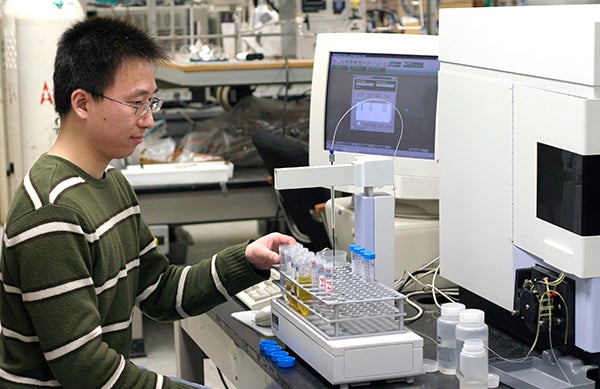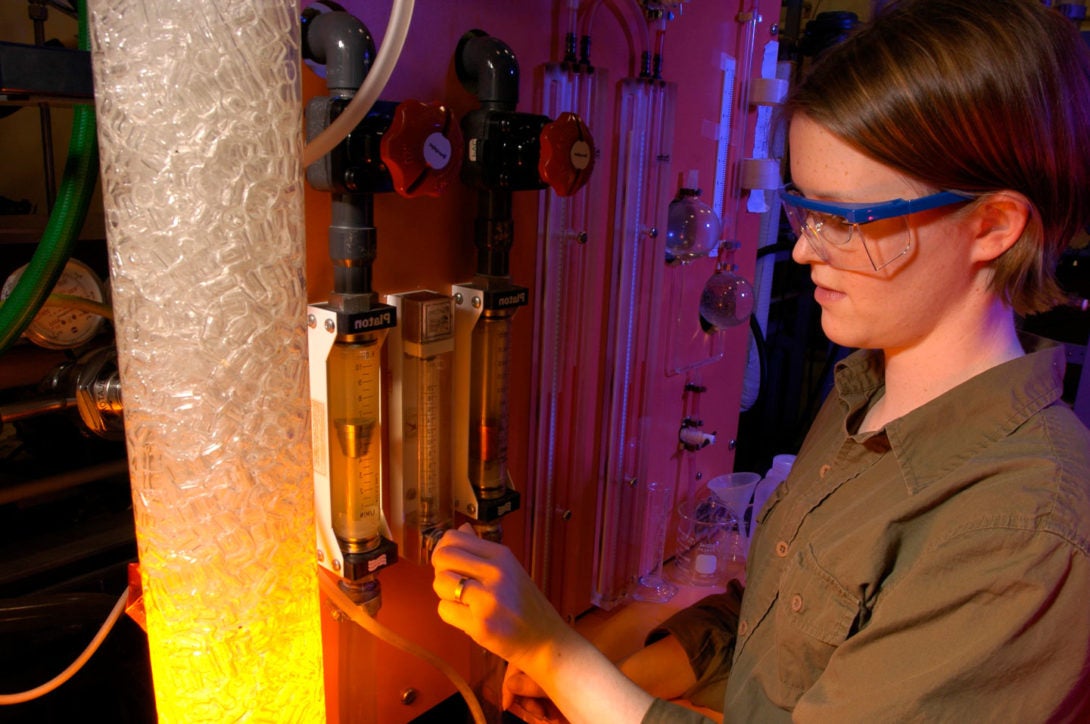Chemical Engineering Major
intro

Chemical engineering answers the question of what chemistry can do to improve the world around us. Chemical engineers are problem-solvers who take raw materials and turn them into useful materials. Our undergraduate program includes a thorough immersion in the core concepts of chemistry—general, organic, physical, and analytical—followed by a series of upper-level chemical engineering courses that develop your ability to apply these concepts to develop new, innovative solutions to engineering problems.
The coursework in our program culminates in the Senior Design course, in which student teams, working with industry mentors, put their knowledge to work on a real-world issue that matters to them. Recent projects have focused on creating biofuels from wood chips, reducing greenhouse-gas emissions by using chemical solvents to capture carbon dioxide, and meeting an increasing global demand for the chemical propylene. Senior Design projects offer a true opportunity to pick a cause you are passionate about and spend two semesters working on it—and the experience often proves valuable when applying for full-time jobs.
UIC chemical engineering also is home to a concentration in biochemical engineering, which is of particular interest to students who love not only chemistry, but also biology. This concentration helps to position students for jobs or further study at the intersection of bioengineering and chemical engineering.

Download our 1-page major overview
Considering chemical engineering? This at-a-glance sheet highlights some of the main reasons to choose this field — and UIC.
Chemical engineering major requirements
Chemical engineering majors complete coursework in four categories:
- Nonengineering and general education courses: Nonengineering and general education courses provide your foundation in chemistry and other core sciences, and include courses that will make you a well-informed and well-rounded college graduate. You will take 73 credit hours in this category, including eight courses in chemistry, two in physics, four in math, and a range of “chart-your-own-path” classes in areas such as Exploring World Cultures and Understanding the Creative Arts. For details on general education requirements, consult the course catalog.
- Required engineering courses: Students earn 49 credit hours from engineering courses that all chemical engineering majors must take. These courses—including Transport Phenomena I, II, and III, Chemical Engineering Thermodynamics, and Material Energy Balances—offer a thorough introduction to the field. Details on these requirements are in the course catalog.
- Technical electives: Chemical engineering majors choose one upper-level elective (3 credit hours) within the department. Options include Nanotechnology for Pharmaceutical Applications, Process Simulation with Aspen Plus, Computational Molecular Modeling, Renewable Energy Technologies, Biochemical Engineering, and more (see the course catalog for details).
- Free elective: Chemical engineering majors also choose one elective (3 credit hours) from anywhere in the College of Engineering or UIC as a whole.
Customize your major with a concentration!
UIC chemical engineering wants to help you stand out in the eyes of future employers.
To that end, chemical engineering majors have the chance to choose one of six concentrations. This represents an area of focus that will demonstrate your interest and expertise, potentially setting you apart from other internship and job applicants.
Open the sections below to learn more about each concentration. Want some additional guidance after you’ve read this information? In this video, Vikas Berry, the department head of chemical engineering, and Alan Zdunek, the director of undergraduate studies, take nine minutes to talk you through it all.
Biochemical engineering
UIC offers a concentration in biochemical engineering for students who want to add an additional layer of specificity to their degree. This option is ideal for students who have an interest in biology or medicine, or for students who envision themselves working with applications of chemical engineering that can have a positive impact on medical treatment and the human body.
Students who choose this concentration complete CHE 422 Biochemical Engineering as their technical elective. In addition, their free elective plus one additional free elective must come from this list:
- BIOS 350 General Microbiology
- BIOS 351 Microbiology Laboratory
- CHEM 352 Introductory Biochemistry
- CHEM 452 Biochemistry I
Because students in the biochemical engineering concentration must choose two free electives, this may elevate the number of credit hours required for the degree to 130 rather than the standard 128 for the chemical engineering major.
Energy and environment
Required courses
- CHE 230 Molecular Systems in Chemical Engineering (3 credits)
- CHE 330 Polymer Science (3 credits*)
ChE technical elective
- CHE 451. Renewable Energy Technologies (3 credits**)
Electives
Enroll in the following course (electives outside the chemical engineering department)
- CME 322 Environmental Engineering (3 credits ***)
Choose one from the following list (second technical elective)
- CHE 450 Air Pollution Engineering
- CHE 453 Electrochemistry
- 400-level course approved by the director of undergraduate studies
- CHE 392 Undergraduate research on a topic thematically linked with polymer science or molecular engineering and approved by a chemical engineering faculty member
Note: Students in this concentration will be required to take a minimum of 134 semester hours for the degree.
* Course fulfills degree’s selective requirement
** Course fulfills degree’s technical elective requirement
*** Course fulfills degree’s electives outside the major rubric requirement
Entrepreneurship
Required course
- CHE 427 Entrepreneurship in Engineering (3 credits*)
Electives
- ENTR 310 Introduction to Entrepreneurship
- ENTR 200 Survey of Entrepreneurship
- 400-level course approved by the chemical engineering department’s director of undergraduate studies
- ENTR 445 New Venture Planning
One non-ChE course from the above list of electives will fulfill the degree’s “elective outside the major rubric” requirement.
Note: Students in this concentration will be required to take a minimum of 131 semester hours for the degree.
* Course fulfills degree’s selective requirement
Nanotechnology
Required courses
- CHE 230 Molecular Systems in Chemical Engineering (3 credits)
- CHE 330 Polymer Science (3 credits*)
ChE technical elective
- CHE 455 Nanoscale Systems in Chemical Engineering (3 credits**)
Electives
Select one of the following*** (electives outside the chemical engineering department)
- ECE 346 Solid State Device Theory
- ME 418 Transport Phenomena in Nanotechnology
- PHYS 431 Modern Physics: Condensed Matter
- ECE 440 Nanoelectronics
- ECE 449/ME 449 Microdevices and Micromachining Technology
- CHEM 458/BIOS 458. Biotechnology and Drug Discovery
- BIOE 485. Nanobiosensors
Choose one from the following list (second technical elective)
- CHE 425 Nanotechnology for Pharmaceutical Applications
- CHE 457 Colloidal and Interfacial Phenomena
- 400-level course approved by the director of undergraduate studies
- CHE 392 Undergraduate research on a topic thematically linked with polymer science or molecular engineering and approved by a chemical engineering faculty member
Note: Students in this concentration will be required to take a minimum of 134 semester hours for the degree.
* Course fulfills degree’s selective requirement
** Course fulfills degree’s technical elective requirement
*** Course fulfills degree’s electives outside the major rubric requirement
Polymers and molecular engineering
Required courses
- CHE 230 Molecular Systems in Chemical Engineering (3 credits)
- CHE 330 Polymer Science (3 credits*)
ChE technical elective
- CHE 454 Molecular and Macromolecular Engineering (3 credits**)
Electives
Select one of the following (electives outside the chemical engineering department)
- PHAR 422 Fundamentals of Drug Action (3 credits***)
- PHAR 423 Biomedicinal Chemistry (3 credits***)
- PHYS 450/BIOE 450 Molecular Biophysics of the Cell (3 credits***)
- CHEM 452 Biochemistry I (3 credits***)
- CHEM 458/BIOS 458 Biotechnology and Drug Discovery (3 credits***)
- PHYS 461 Thermal and Statistical Physics (3 credits***)
- BIOE 485 Biosensors (3 credits***)
Choose one from the following list (second technical elective)
- CHE 425 Nanotechnology for Pharmaceutical Applications
- CHE 438 Computational Molecular Modeling
- CHE 440 Non-Newtonian Fluids
- CHE 453 Electrochemistry
- CHE 455 Nanoscale Systems in Chemical Engineering
- CHE 457 Colloidal and Interfacial Phenomena
- 400-level course approved by the Director of Undergraduate Studies
- CHE 392 Undergraduate research on a topic thematically linked with polymer science or molecular engineering and approved by a chemical engineering faculty member
Note: Students in this concentration will be required to take a minimum of 134 semester hours for the degree.
* Course fulfills degree’s selective requirement
** Course fulfills degree’s technical elective requirement
*** Course fulfills degree’s electives outside the major rubric requirement
Process automation
Required courses
- CHE 433 Process Simulation with Aspen Plus (3 credits*)
Electives
Choose two courses from the following:
- ECON 120 Principles of Microeconomics
- IE 201 Financial Engineering
- MATH 310 Applied Linear Algebra
- MATH 419 Models in Applied Mathematics
One of the above courses will fulfill the degree’s “electives outside the major rubric” requirement.
Note: Students in this concentration will be required to take a minimum of 131 semester hours for the degree.
* Course fulfills degree’s selective requirement
ChE majors in their own words

Daniela Estarita
Chemical Engineering, BS ’21 | Northwest suburbs
Favorite course: CHE 312 Transport Phenomena II.
Favorite thing about your department: The new Engineering Innovation Building and Professor Sharma‘s research!
Most challenging engineering project/assignment you’ve conquered so far: Going from ordinary to partial differential equations and using dimensionless analysis.
Which was the most valuable internship or lab experience you’ve had, and how did it help you? The Optics, Dynamics, Elasticity and Self-Assembly Lab taught me the importance of teamwork and guidance.
Geraldine Guerrero

Geraldine Guerrero
Chemical Engineering, BS ’22 | Chicago, IL
Engineering project/assignment you did that you’re most proud of: Making mini solar panels.
Coolest department at UIC outside of your major: Gender and Women Studies.
Would you recommend the College of Engineering to new applicants? Yes. I believe they would be making one of the best choices for their career and for their own personal experience.
Favorite place in Chicago: The 606.
Learn more about the chemical engineering major
Program Educational Objectives: ChE Major

The chemical engineering program at UIC is accredited by the Engineering Accreditation Commission of ABET, http://www.abet.org.
As part of our accreditation process, ABET asks our department to capture the overall goals of the chemical engineering program. These are called our educational program objectives. They are:
- In engineering practice, advanced study, or original research, UIC chemical engineering bachelor’s degree graduates will be effective in applying fundamental principles, scientific knowledge, rigorous analysis, creative design, and conceptual innovation.
- Based upon mastery of engineering in a broad, societal context, UIC chemical engineering graduates will have successful careers in the public or private sectors, or in the pursuit of graduate education.
- In the service of industry, government, the engineering profession, and society at large, graduates will function effectively in the complex modern work environment with clear communication, responsible teamwork, and high standards of ethics, professionalism, safety, and protection of the environment.
- Based upon a rigorous undergraduate program that is innovative, challenging, open, and supportive, graduates will enhance their skills and knowledge through life-long learning and will demonstrate professional leadership.
Student Outcomes: ChE Major
Another part of the ABET accreditation process requires the department to identify the specific knowledge and skills that students are intended to have when they complete their undergraduate education. These are called student outcomes.
Students graduating from the chemical engineering program at UIC will have:
- an ability to identify, formulate, and solve complex engineering problems by applying principles of engineering, science, and mathematics.
- an ability to apply engineering design to produce solutions that meet specified needs with consideration of public health, safety, and welfare, as well as global, cultural, social, environmental, and economic factors.
- an ability to communicate effectively with a range of audiences.
- an ability to recognize ethical and professional responsibilities in engineering situations and make informed judgments, which must consider the impact of engineering solutions in global, economic, environmental, and societal contexts.
- an ability to function effectively on a team whose members together provide leadership, create a collaborative and inclusive environment, establish goals, plan tasks, and meet objectives.
- an ability to develop and conduct appropriate experimentation, analyze and interpret data, and use engineering judgment to draw conclusions.
- an ability to acquire and apply new knowledge as needed, using appropriate learning strategies.
In the 2021-2022 academic year, 245 students are enrolled at UIC Engineering as chemical engineering majors across all class years. The department graduated 58 chemical engineering majors in the academic year ending August 2021. View historical enrollment and graduation data here.